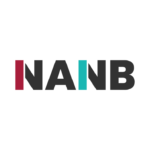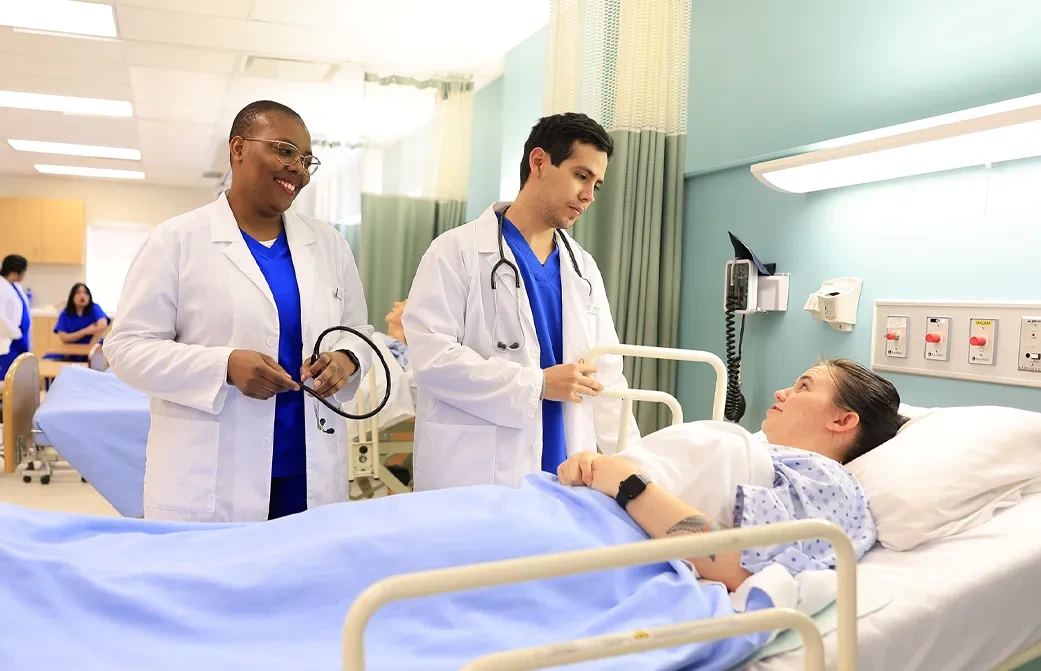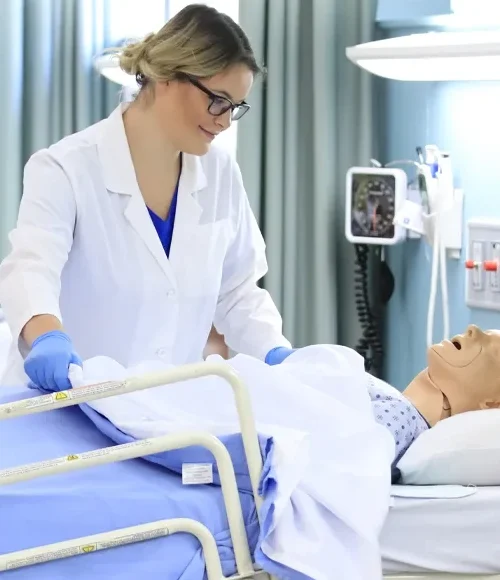Bachelor of Science in Nursing (BScN) – Moncton, NB
Hands-on Experience
1,700+ Hours of
Practical Training
Financial Aid Support
Scholarships, Grants,
and Bursaries Available
Small Class Sizes
With Small Class Sizes,
Capped at 36 Students
Flexible Start Date
Choose your intake
January, May or September
Program Overview
At Oulton College, our Bachelor of Science in Nursing (BScN) program is designed for passionate individuals ready to make a difference in healthcare. This accelerated nursing program equips you with the skills, knowledge, and hands-on experience needed to become confident, compassionate, and highly skilled nurses. Upon successful completion of your NCLEX exam, you will earn the title of Registered Nurse (RN).
With a strong focus on clinical training, small class sizes, and expert faculty support, our nursing program ensures that you graduate workforce-ready and prepared to meet the growing demand for nursing professionals. Whether you’re starting your journey or advancing your career, Oulton College provides the practical experience and academic excellence you need to succeed.
Accreditation & Eligibility
The Bachelor of Science in Nursing (BScN) degree at Oulton College is approved by the Maritime Provinces Higher Education Commission (MPHEC) and holds preliminary approval from the Nurses Association of New Brunswick (NANB).
Graduates of this program will be eligible to apply for registration as a Registered Nurse (RN) in New Brunswick.
NANB preliminary approval means the program has met all the required standards to begin offering nursing education. Although the program has not yet graduated its first class, NANB confirms that graduates will be recognized as having completed an approved nursing program. After the first class finishes, NANB will conduct a final review to grant full approval.
MPHEC approval confirms that the BScN degree meets the academic and quality standards required for degree-level programs in the Maritime provinces.


Accelerated BScN Degree in Moncton
- High Job Demand – Direct pathway to RN licensure
- Financial Support – Scholarships & funding options available
- Expert Faculty – Learn from Registered Nurses with Master’s or PhD degrees
- Modern Curriculum – Build essential skills in Anatomy, Pathophysiology, Pharmacology, and more
- Practicum Placement – Gain real-world experience and connect with potential employers

Real-World Nursing Training with AI Simulation Labs
We go beyond the classroom with hands-on training, AI-driven simulations, and state-of-the-art labs, equipping students with the skills and confidence for real-world patient care.
- AI-Powered Training – Practice patient care with adaptive AI patient simulations that provide real-time feedback.
- Emergency Code Simulations – Train for critical care situations with realistic, high-pressure scenarios.
- Real-World Skills – Gain experience in patient assessment, medication administration, and emergency response.
- State-of-the-Art Labs – Work with modern medical equipment in a simulated hospital environment.
- Team-Based Learning – Collaborate with classmates in interactive, problem-solving exercises.
Financial Options Available
There are many funding opportunities available for students pursuing a career in healthcare. Our Financial Aid Team is here to help! Whether you’re looking for scholarships, bursaries, student loans, grants, or flexible payment plans, we’ll guide you through the process to maximize your financial support.
Canada Student Grant for Full-Time Students
$525 per month of study
New Brunswick Student Loan
Up to $200 per week of study
Canadian Student Loan
Up to $300 per week of Study
Oulton College Memorial Scholarship
Up to $1,000
New Brunswick Bursary
Up to $160 per week of study
Renewed Tuition Bursary
$1,500 for college students
Canada Student Grant for
Students with Disabilities
$2,800 per academic year if applicable
Canada Student Grant for Services and Equipment – Students with Disabilities
Up to $20,000 per academic year
Canada Student Grant for
Full-Time Students with Dependants
$280 per month of study per child
Our financial aid advisors are ready to help you.
Career Outcomes & Registered Nurse Pathway
Becoming a Registered Nurse
Nursing is one of the most in-demand careers in Canada, offering job security, competitive salaries, and opportunities for growth. With our BScN program, you’ll be job-ready and eligible to take the NCLEX exam to become a licensed Registered Nurse (RN).
As a graduate, you’ll be prepared for diverse nursing roles in hospitals, clinics, long-term care, and community health settings. For more details on career opportunities and salary expectations, visit NBJobs.ca.

Admissions Requirements
- Grade 12 Diploma, Adult Diploma or GED.
- Grade 12 Biology with a minimum average of 70%.
- Grade 12 Chemistry with a minimum average of 70%.
- Grade 12 Academic Math with a minimum average of 70%.
- Grade 12 English or French with a minimum average of 70%.
- Meeting with an Admissions Advisor.
- Successful completion of the health science application process.
Frequently Asked Questions
What is the Bachelor of Science in Nursing (BScN) program at Oulton College?
The BScN Program is an accelerated, evidence-based degree in Moncton, NB, preparing students for a successful career as a Registered Nurse (RN). It blends scientific theory with hands-on clinical experience, aligning with NANB standards for licensure and nursing jobs in Moncton and Atlantic Canada.
How long is the Oulton College BScN program?
Oulton College’s nursing program is an accelerated 3-year degree. Delivered full-time, it allows students to become a Registered Nurse (RN) quickly.
What are the career opportunities for Registered Nurses (RNs) in New Brunswick after graduating from Oulton College?
RNs graduating from Oulton College’s BScN Program have excellent job prospects. Opportunities include hospitals in Moncton (like Horizon and Vitalité Health Networks), long-term care, community health, and more. The province often offers recruitment incentives, and bilingualism enhances nursing job opportunities here.
Is the Oulton College BScN program accredited?
Yes, Oulton College’s nursing degree in Moncton is approved by the Nurses Association of New Brunswick (NANB), the provincial regulatory body for RNs. This confirms it meets rigorous standards for nursing education and RN licensure. Oulton College is also approved by the MPHEC to grant degrees and is actively pursuing national accreditation through CASN.
How do I become a Registered Nurse (RN) in New Brunswick after graduation?
To become a Registered Nurse (RN) in New Brunswick after graduating from Oulton College’s approved BScN Program, you must:
- Pass the NCLEX-RN, the national licensure examination.
- Apply for registration with the Nurses Association of New Brunswick (NANB), meeting additional requirements.
Our nursing program fully prepares you for this process to practice as an RN in the province.
What are the admission requirements for the BScN program?
Applicants typically need a high school diploma with strong grades in English, Math, and two sciences (Biology and Chemistry recommended). Additional requirements for Oulton’s nursing program may include an interview, essay, or reference letters.
What kind of clinical experience will I get in this program?
Students complete over 1,400 hours of diverse clinical placements in hospitals, long-term care homes, and community health settings across Moncton and the surrounding region. These hands-on experiences begin early and increase in complexity each program year.
Please Note: Content is subject to change by administration as required to meet program and profession standards.
Why Choose Oulton College
Best Canadian Nursing School
Proudly Canadian since 1956
We've built a strong network, ensuring graduates are career-ready in healthcare.
Financial Support
We offer scholarships, bursaries, and flexible payment options.
+ 90% Success Rate
Over 90% placement rates for all program.
Career Services
Our team connects you with employers and helps with resumes and job-market skills.
Campus Facilities
Train in state-of-the-art nursing labs with the latest medical technology.
Industry Partnerships
We partner with healthcare providers to offer placements and job opportunities.
Student Services
24/7 free counseling services, academic support, and one-on-one guidance.
In-person Classes
Nursing is hands-on. choose in-person learning and stand out to employers.
Get the Full Program Details
Want to learn more about our Bachelor of Science in Nursing (BScN) program? Download our detailed program guide to explore course curriculum & program structure.

